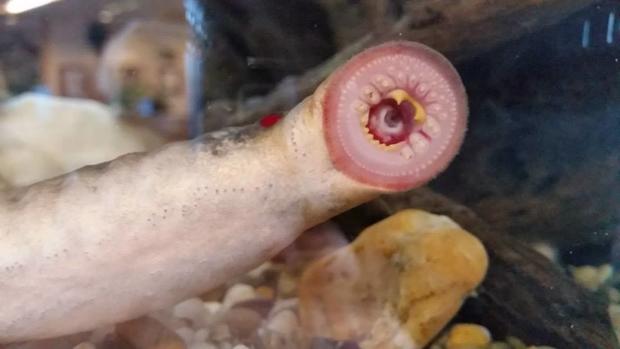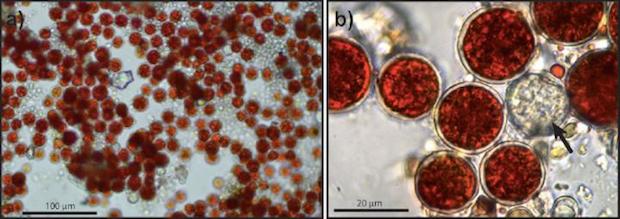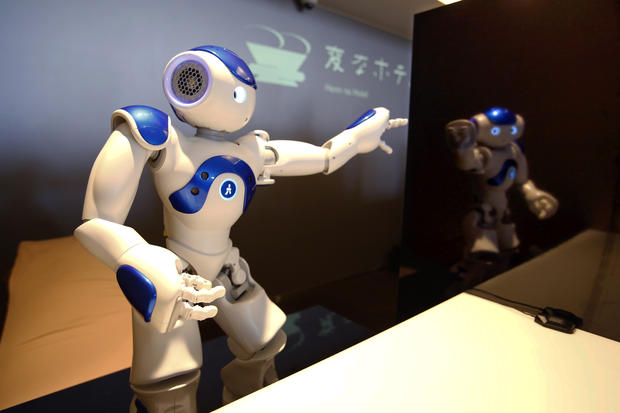Weirdest science stories of the year
The rain in Spain seemed to turn a gory shade of blood red. A scientist revealed he hadn't showered in more than 10 years. Somehow, tapeworms got even worse. These are just a few of the weird things that happened this year around the world. Here are the strangest (and arguably, the coolest) science stories of 2015.
Blood rain
Last fall, residents of several villages in northwest Spain were alarmed when the water in their local fountains turned an unsettling shade of crimson. But the blood-red water wasn't the work of a cold-hearted killer; it was actually the result of natural processes. A study published in September 2015 found that Spain's bloodbaths were teeming with the microscopic freshwater algae Haematococcus pluvialis, which produce a red pigment when they're stressed. Such algae aren't all that unusual in other parts of the world, but they rarely turn up in northwest Spain, the scientists said. Still, the researchers behind the recent study about the "blood rain" have yet to determine how the algae found its way into the village fountains.
Parasite surprise
A Colombian man with lung tumors developed the malignant growths in a very unusual way: A tapeworm growing inside him was full of cancerous cells that spread to the man's cells, eventually killing him. It was the first known report of a person becoming sick from cancer cells that developed in a parasite, said the researchers who studied the man's case. The 41-year-old man was HIV positive, which may have weakened his immune system, allowing the parasitic cancer cells to grow unchecked inside his body, the researchers said. [Read the full story about the cancerous tapeworm]
Stinky experiment
How long can you go without showering? Two days? Three? Perhaps a whole week? Well, one man recently announced that he hasn't showered in 12 years -- on purpose. The man, a chemical engineer in Boston, said he believes that humans don't need to shower to be healthy. In fact, he said that bathing may strip the skin of beneficial bacteria that keep odor-causing bacteria at bay. The man's strange experiment goes hand-in-hand with his development of a bacteria-containing body spray that is supposed to keep BO in check, even in the absence of a daily shower. [Read the full story about the man who hasn't showered in 12 years]
Poop problems
For Halloween this year, Burger King unveiled an unusual menu item: a Whopper with a black bun. At first, this spooky-looking burger seemed like a totally harmless way to celebrate All Hallows' Eve, but once digested, the black bun yielded an unsavory surprise. The Halloween Whopper turned people's poop green. The emerald-hued stools were likely the result of the black bun's abundance of food coloring, which is often not fully absorbed by the intestines, resulting in oddly colored poop. [Read the full story about the strange effects of the Halloween Whopper]
World's longest fingernails
A lot of world records were awarded in 2015, but perhaps the strangest of these accolades was bestowed upon a man in India who hasn't cut his fingernails since 1952. Shridhar Chillal earned a Guinness World Record for his 30-foot-long (9 meters) claws, which have not been trimmed in 62 years. Sure, his long nails make certain daily tasks more difficult (even sleeping through the night is an issue), but now the 78-year-old has a nice plaque to show for his efforts. [Read the full story about the world's longest fingernails]
Robot battle
Talk about the geekiest battle of the year: MegaBots, a robotics startup in Boston, recently challenged its one and only competitor, Suidobashi Heavy Industry of Japan, to a duel. MegaBots builds giant, human-piloted robots that look like something out of a "Power Rangers" episode. The company's 15-foot-tall (4.6 m) bot, the Mark II, is set to take on Suidobashi's Kuratas -- a 13-foot-tall (4 m) robot with an onboard arsenal of rapid-fire BB guns -- in 2016. [Read the full story about the giant robot battle]
Spiky snack
A snake in South Africa opted for an unusual snack in June, and the decision cost the poor reptile its life. The 12.8-foot-long (3.9 m) python swallowed a porcupine whole. Dining on porcupines isn't all that unusual for pythons in Lake Eland Game Reserve in KwaZulu-Natal, South Africa. But what happened next is not the norm. The python fell off a rocky ledge while digesting its meal, and park rangers think that, upon the snake's impact with the ground below, the porcupine's spikes may have pierced the python's digestive tract, causing the animal's death. [Read the full story about the porcupine-eating python]
Spider shower
In May, residents of southwest Australia had some unusual weather. Millions of tiny spiders "rained down" on a region of New South Wales, covering the land with their sticky webs. "Spider rain" or "angel hair," occurs when spiders exhibit a behavior known as ballooning, in which they release a small amount of silk from their spinnerets, which catches in the breeze, transporting the critters to a new location. Normally, ballooning goes unnoticed by most humans. But sometimes, weather conditions prohibit spiders' ability to balloon for weeks at a time. When the bad weather finally lifts, millions of the arachnids will balloon at once, causing spidery conditions that are hard to overlook.
Zombie retreat
A very important question was answered in 2015: Where should Americans retreat in the event of a zombie apocalypse? Researchers from Cornell University in Ithaca, New York, performed a full-scale computer simulation to determine how "zombie outbreaks" would spread through the United States. The scientists found that the best place to run when all of your neighbors turn into flesh-eating monsters is the Rocky Mountains, an inaccessible and sparsely populated region. The worst place to be when the zombies take over is the city, any city, the researchers said. Head for the hills! [Read the full story about the zombie simulation]
Robot hospitality
This year, developers in Japan announced the opening of a unique kind of hotel. The Henn-na Hotel, which translates to "strange hotel," is staffed almost entirely by robots. Reception attendants, waiters, cleaning staff and cloakroom attendants are actually walking, talking bots. These humanoid helpers (there are a few dinosaur- and plant-inspired bots, as well) are "employed" at the hotel just outside of Huis Ten Bosch, a theme park in Nagasaki that is modeled after a typical Dutch town.
[Read the full story about the robot hotel]
- By Elizabeth Palermo
Follow Elizabeth Palermo @techEpalermo. Follow Live Science @livescience, Facebook & Google+. Original article on Live Science.











